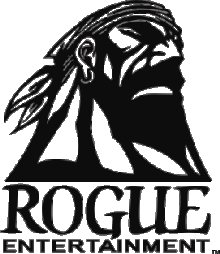Rogue Entertainment
Rogue Entertainment was a computer game developer based in Dallas, Texas, which was active in the late 1990s. It was founded by Rich Fleider, Steve Maines, and Jim Molinets in 1994.[1][2] Rogue Entertainment's office was in the same building as id Software, all of their games used game engines created by id Software, and two of their games were expansions for id Software's Quake series of games.[1] The company's first game, Strife: Quest for the Sigil, was released as shareware on February 23, 1996, with the retail version later being released on May 31, 1996. Many former Rogue Entertainment employees moved to Nerve Software after Rogue Entertainment shut down.
 | |
| Privately held company | |
| Industry | Video games |
| Founded | 1994 |
| Defunct | 2001 |
| Headquarters | Dallas, Texas , U.S. |
| Products | Strife American McGee's Alice |
| Website | rogue-ent.com (archived) |
Games developed by Rogue Entertainment
- Strife (1996) (PC)
- Quake Mission Pack No. 2: Dissolution of Eternity (1997) (PC)
- Quake II Mission Pack: Ground Zero (1998) (Windows)
- Quake II (1999) (Nintendo 64)[2]
- American McGee's Alice (2000) (Windows)
- Counter-Strike: Condition Zero (never published, development passed back to Valve, later to Gearbox Software)[3][4]
gollark: Or "So, XD x".
gollark: Also, presumably the rarer alts of common ones, like red dorsals and tan ridgewings.
gollark: Probably non-CB metallics, too.
gollark: Blusang Lindwyrms maybe?>
gollark: It might be a good deal for you if they're offering several hatchlings.
References
- "Sharky Games – PC – Games – Get Personal – Interview with Rich Fleider". sharkygames.com. Retrieved February 26, 2009.
- "Rogue Entertainment > Overview". allgame.com. Allgame. Retrieved February 26, 2009.
- "The History of Counter-Strike: Condition Zero". YouTube. Retrieved November 3, 2016.
- "What's Up with Condition Zero?". 1up.com. 1UP.com. January 1, 2000. Archived from the original on July 29, 2012. Retrieved February 26, 2009.
External links
This article is issued from Wikipedia. The text is licensed under Creative Commons - Attribution - Sharealike. Additional terms may apply for the media files.